人教版九年级英语Unit 8 It must belong to Carla.教案
- 格式:doc
- 大小:105.50 KB
- 文档页数:14
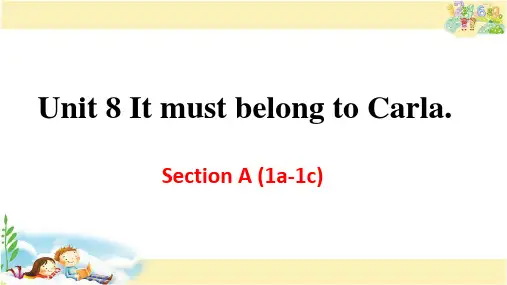
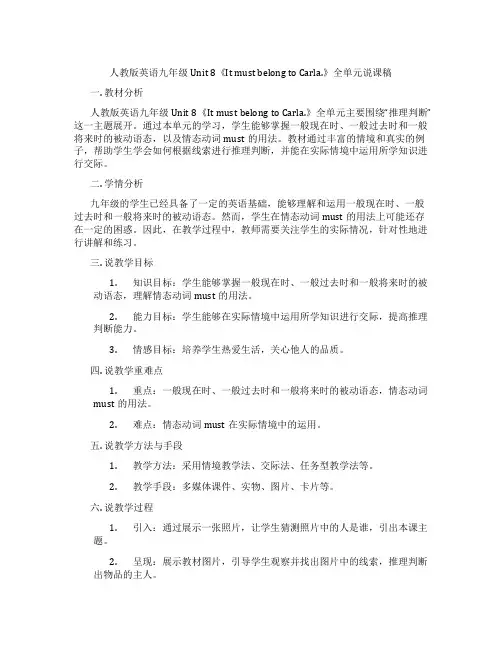
人教版英语九年级Unit 8《It must belong to Carla.》全单元说课稿一. 教材分析人教版英语九年级Unit 8《It must belong to Carla.》全单元主要围绕“推理判断”这一主题展开。
通过本单元的学习,学生能够掌握一般现在时、一般过去时和一般将来时的被动语态,以及情态动词must的用法。
教材通过丰富的情境和真实的例子,帮助学生学会如何根据线索进行推理判断,并能在实际情境中运用所学知识进行交际。
二. 学情分析九年级的学生已经具备了一定的英语基础,能够理解和运用一般现在时、一般过去时和一般将来时的被动语态。
然而,学生在情态动词must的用法上可能还存在一定的困惑。
因此,在教学过程中,教师需要关注学生的实际情况,针对性地进行讲解和练习。
三. 说教学目标1.知识目标:学生能够掌握一般现在时、一般过去时和一般将来时的被动语态,理解情态动词must的用法。
2.能力目标:学生能够在实际情境中运用所学知识进行交际,提高推理判断能力。
3.情感目标:培养学生热爱生活,关心他人的品质。
四. 说教学重难点1.重点:一般现在时、一般过去时和一般将来时的被动语态,情态动词must的用法。
2.难点:情态动词must在实际情境中的运用。
五. 说教学方法与手段1.教学方法:采用情境教学法、交际法、任务型教学法等。
2.教学手段:多媒体课件、实物、图片、卡片等。
六. 说教学过程1.引入:通过展示一张照片,让学生猜测照片中的人是谁,引出本课主题。
2.呈现:展示教材图片,引导学生观察并找出图片中的线索,推理判断出物品的主人。
3.讲解:讲解一般现在时、一般过去时和一般将来时的被动语态,情态动词must的用法。
4.练习:学生分组进行角色扮演,运用所学知识进行交际。
5.巩固:学生完成教材练习题,检测所学知识。
6.拓展:引导学生运用所学知识,谈论现实生活中的人和事。
七. 说板书设计板书设计需突出本课重点内容,包括一般现在时、一般过去时和一般将来时的被动语态,以及情态动词must的用法。
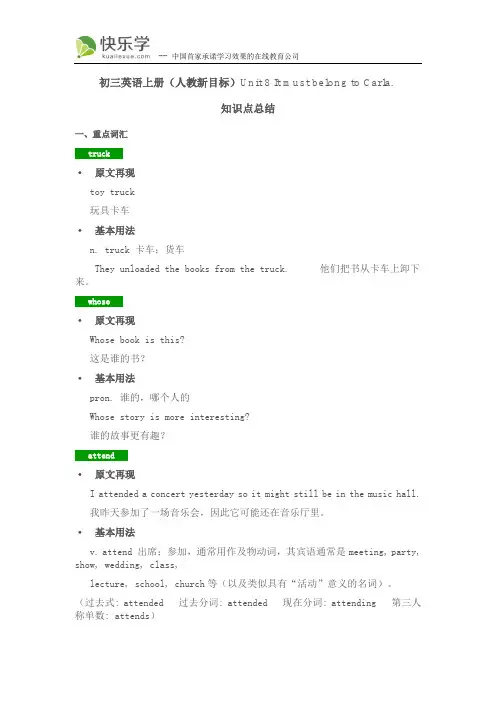
初三英语上册(人教新目标)Unit 8 It must belong to Carla.知识点总结一、重点词汇truck·原文再现toy truck玩具卡车·基本用法n. truck 卡车;货车They unloaded the books from the truck. 他们把书从卡车上卸下来。
whose·原文再现Whose book is this?这是谁的书?·基本用法pron. 谁的,哪个人的Whose story is more interesting?谁的故事更有趣?attend·原文再现I attended a concert yesterday so it might still be in the music hall.我昨天参加了一场音乐会,因此它可能还在音乐厅里。
·基本用法v. attend 出席;参加,通常用作及物动词,其宾语通常是meeting, party, show, wedding, class,lecture, school, church等(以及类似具有“活动”意义的名词)。
(过去式: attended 过去分词: attended 现在分词: attending 第三人称单数: attends)Did you attend the meeting yesterday?你昨天去开会了吗?He was ill and didn’t attend sc hool.他有病,没有去上学。
·知识拓展相关短语attend to 注意;专心于;照料。
如:If you don’t attend to your teacher, you will never learn anything.你要是不注意听老师讲,你就会什么也学不到。
If you go out, who will attend to the baby?你要是出去,谁来照顾婴儿?词义辨析:attend/join/join in/take part in这些动词或词组均含“参加,加入”之意。
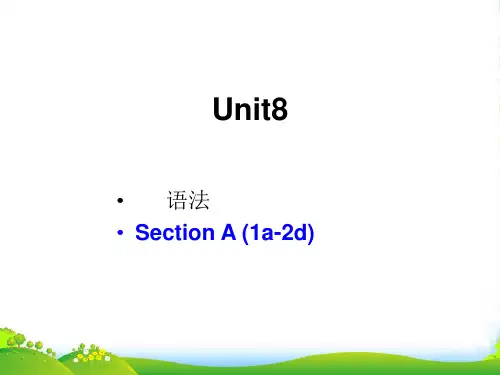
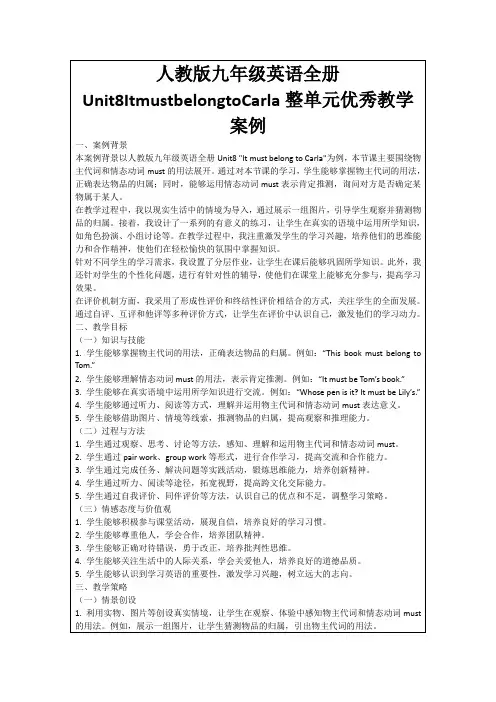
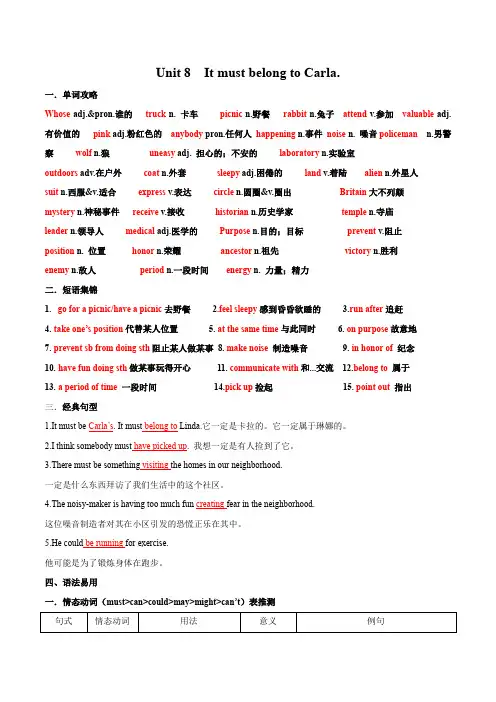
Unit 8 It must belong to Carla.一.单词攻略Whose adj.&pron.谁的truck n. 卡车picnic n.野餐rabbit n.兔子attend v.参加valuable adj.有价值的pink adj.粉红色的anybody pron.任何人happening n.事件noise n. 噪音policeman n.男警察wolf n.狼uneasy adj. 担心的;不安的laboratory n.实验室outdoors adv.在户外coat n.外套sleepy adj.困倦的land v.着陆alien n.外星人suit n.西服&v.适合express v.表达circle n.圆圈&v.圈出Britain大不列颠mystery n.神秘事件receive v.接收historian n.历史学家temple n.寺庙leader n.领导人medical adj.医学的Purpose n.目的;目标prevent v.阻止position n. 位置honor n.荣耀ancestor n.祖先victory n.胜利enemy n.敌人period n.一段时间energy n. 力量;精力二.短语集锦1.go for a picnic/have a picnic去野餐2.feel sleepy感到昏昏欲睡的3.run after追赶4.take one’s position代替某人位置5. at the same time与此同时6. on purpose故意地7.prevent sb from doing sth阻止某人做某事8. make noise 制造噪音9. in honor of 纪念10.have fun doing sth做某事玩得开心11. communicate with和...交流12.belong to属于13.a period of time 一段时间14.pick up捡起15. point out指出三.经典句型1.It must be Carla’s. It must belong to Linda.它一定是卡拉的。
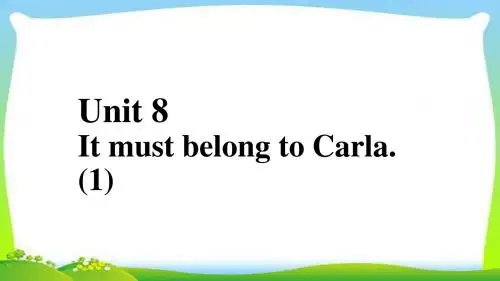
![【配套K12】[学习]九年级英语全册 Unit 8 It must belong to Carla](https://uimg.taocdn.com/4ba4286b69eae009581becd0.webp)
Unit 8 It must belong to Carla. Section A1. It must belong to Carla. 它一定是卡拉的。
“must+动词原形”表示对现在的情况进行推测、推论或判断,语气十分肯定,意为“一定,肯定”。
must表示推测的这种用法只用在肯定句中。
如:Tom must be in the reading room. 汤姆肯定在阅览室里。
You must look beautiful in that skirt. 你穿上那条裙子看起来一定会很漂亮。
[易错警醒] 对现在情况有把握的否定猜测用can’t。
如:That man can’t be Mr. Wang. He is ill in hospital. 那个人不可能是王先生,他生病住院了。
2. Whose volleyball is this? 这是谁的排球?whose 作代词“谁的”,whose不等于who’s。
whose是who的所有格形式,意为“谁的”,而who’s 是who is的缩略形式,意为“谁是”。
但whose与who’s同音,都读作[huːz]。
whose在句中可作表语、定语等。
例如:Whose is that computer? 那台电脑是谁的?(作表语)Whose sweaters are these? 这些是谁的毛衣?(作定语)归纳:whose用来对物主代词及名词所有格进行提问:①提问形容词性的物主代词和名词性的物主代词。
例如:These are my bananas. 这些是我的香蕉→Whose bananas are these?这些香蕉是谁的?That bedroom is mine. 那间卧室是我的。
→Whose is that bedroom?那间卧室是谁的?③提问名词所有格(不包括of构成的所有格)。
例如:Those are the twins’ bags.那些是双胞胎的书包。
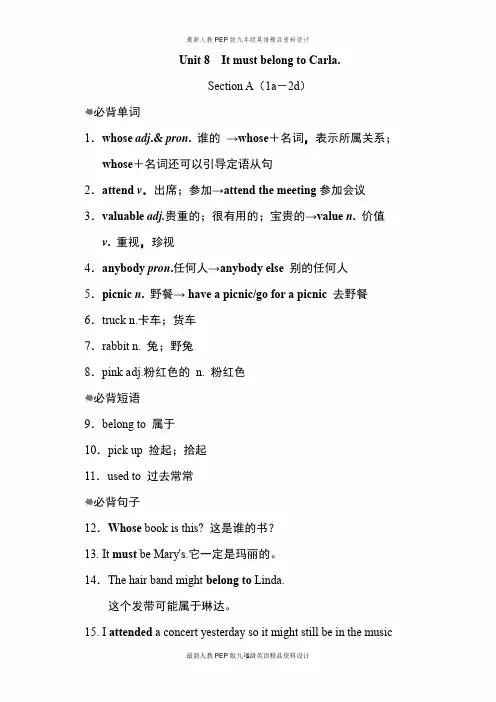
Unit 8 It must belong to Carla.Section A(1a-2d)必背单词1.whose adj.& pron. 谁的→whose+名词,表示所属关系;whose+名词还可以引导定语从句2.attend v.出席;参加→attend the meeting参加会议3.valuable adj.贵重的;很有用的;宝贵的→value n. 价值v. 重视,珍视4.anybody pron.任何人→anybody else 别的任何人5.picnic n. 野餐→ have a picnic/go for a picnic 去野餐6.truck n.卡车;货车7.rabbit n. 兔;野兔8.pink adj.粉红色的n. 粉红色必背短语9.belong to 属于10.pick up 捡起;拾起11.used to 过去常常必背句子12.Whose book is this? 这是谁的书?13. It must be Mary's.它一定是玛丽的。
14.The hair band might belong to Linda.这个发带可能属于琳达。
15. I attended a concert yesterday so it might still be in the musichall. 昨天我参加了一个音乐会,所以它可能还在音乐厅。
16.Do you have anything valuable in your schoolbag?在你的书包里有什么贵重物品吗?Section A(3a~4c)必背单词1.noise n.声音;噪音→noisy adj.吵闹的→make noise 制造噪音2.policeman n.男警察→ policemen(pl.)3.wolf n.狼→wolves(pl.)4.sleepy adj.困倦的;瞌睡的→feel sleepy 感到困倦;→asleep adj.睡着的→fall asleep入睡→ be asleep睡着→sleeping adj.熟睡的→ a sleeping baby一个熟睡的婴儿5.laboratory n.实验室6.coat n.外套;外衣必背短语7.nothing much 没什么事8.at first 起初9.in the neighborhood 在街区里10.go away 离开必背句子11. Something unusual is happening in our town.不寻常的事正发生在我们镇上。
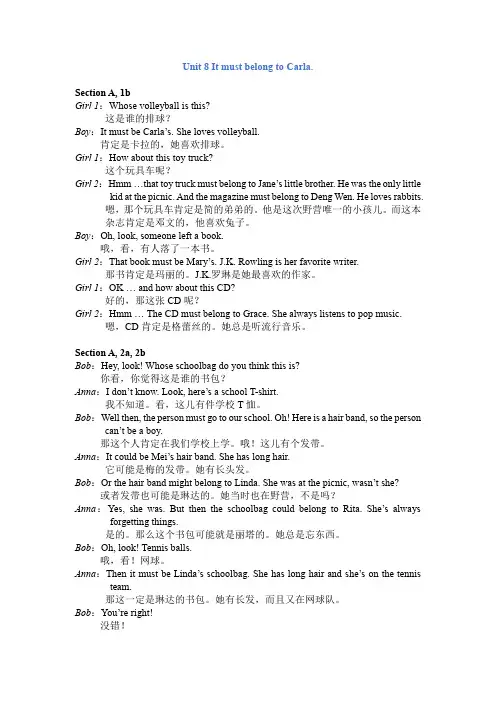
Unit 8 It must belong to Carla.Section A, 1bGirl 1:Whose volleyball is this?这是谁的排球?Boy:It must be Carla’s. She loves volleyball.肯定是卡拉的,她喜欢排球。
Girl 1:How about this toy truck?这个玩具车呢?Girl 2:Hmm …that toy truck must belong to Jane’s little brother. He was the only little kid at the picnic. And the magazine must belong to Deng Wen. He loves rabbits.嗯,那个玩具车肯定是简的弟弟的。
他是这次野营唯一的小孩儿。
而这本杂志肯定是邓文的,他喜欢兔子。
Boy:Oh, look, someone left a book.哦,看,有人落了一本书。
Girl 2:That book must be Mary’s. J.K. Rowling is her favorite writer.那书肯定是玛丽的。
J.K.罗琳是她最喜欢的作家。
Girl 1:OK … and how about this CD?好的,那这张CD呢?Girl 2:Hmm … The CD must belong to Grace. She always listens to pop music.嗯,CD肯定是格蕾丝的。
她总是听流行音乐。
Section A, 2a, 2bBob:Hey, look! Whose schoolbag do you think this is?你看,你觉得这是谁的书包?Anna:I don’t know. Look, here’s a school T-shirt.我不知道。
看,这儿有件学校T恤。
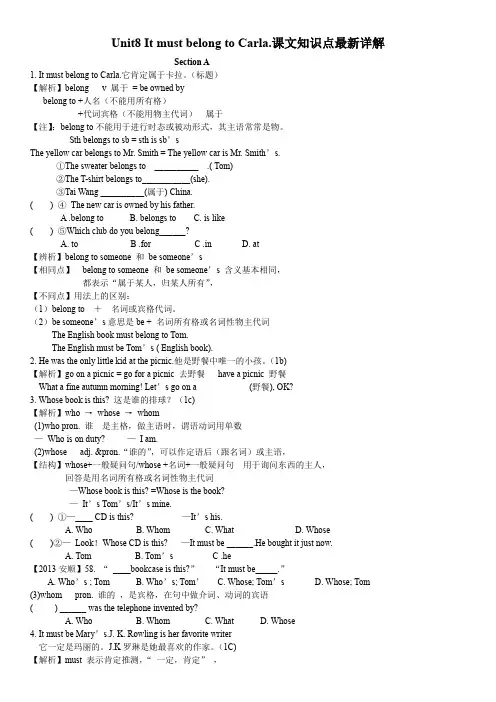
Unit8 It must belong to Carla.课文知识点最新详解Section A1. It must belong to Carla.它肯定属于卡拉。
(标题)【解析】belong v 属于= be owned bybelong to +人名(不能用所有格)+代词宾格(不能用物主代词)属于【注】:belong to不能用于进行时态或被动形式,其主语常常是物。
Sth belongs to sb = sth is sb’sThe yellow car belongs to Mr. Smith = The yellow car is Mr. Smith’s.①The sweater belongs to __________ .( Tom)②The T-shirt belongs to___________(she).③Tai Wang __________(属于) China.( ) ④The new car is owned by his father.A .belong to B. belongs to C. is like( ) ⑤Which club do you belong______?A. to B .for C .in D. at【辨析】belong to someone 和be someone’s【相同点】belong to someone 和be someone’s 含义基本相同,都表示“属于某人,归某人所有”,【不同点】用法上的区别:(1)belong to+名词或宾格代词。
(2)be someone’s意思是be + 名词所有格或名词性物主代词The English book must belong to Tom.The English must be Tom’s ( English book).2. He was the only little kid at the picnic.他是野餐中唯一的小孩。
九年级Unit 8 It must belong to Carla.Section B听力对话课文基础填空本试题源于课本,取于课本,注重双基,从字词句出发,达到掌握课本基础知识的目的。
本题运用由浅入深重复练习的方式,熟能生巧,达到回归课本掌握知识的效果。
对于好学生,这个试题可以查漏补缺,对于需要提高分数的同学,是脚踏实地的让愿望实现的途径,老师可以直接使用,排版有利于打印测试,单页单章页码调整到位,方便助力老师的教学。
本题全部取材于课本,方便家长辅导学生的学习。
本题将课本上所有的听力文本,对话,长短课文,均以提高巩固的目的进行了不同类型的试题编排,是学习的好帮手。
九年级-U8-SECTION B 听力1c, 1d---听1轮,填单词:Hey, look at the man ________ down the street. I wonder what's ________? He ________ be running for exercise. But he's ________ a ________. He ________ be late for work. He looks ________ of afraid. (pause) Oh,no! What's that? Where? ________ something in the sky. It ________ be a plane. No, it ________ be a plane. It's too big. It ________ be a UFO.A UFO? What's ________ on?n: Look, now the UFO is ________ ...And there's something strange ________ out. It must be an ________. And the alien is running ________ the man! I must be ________. Maybe we should call the ________. (pause) Hey, wait a ________. What’s that?Where? Over there. It's a woman ________ a camera.She could be from the TV news. No, look at________ those other people. They're ________. Oh! They must be ________ a movie九年级-U8-SECTION B 听力1c, 1d---听2轮,填词组:Hey, look at the man ___________ the street. I wonder ___________. He could be____________. But he's ___________. He might ___________. He___________ afraid. (pause) Oh,no! What's that? Where? ___________ in the sky.It could be a plane. No, it can't be a plane. It's too big. It _______ a UFO. A UFO? What's___________?Look, now the UFO___________ ...And there's something strange ___________. It________ an alien. And the alien is___________ the man! I ___________. Maybe we should ___________. (pause) Hey, ___________. What’s that? Where? Over there. It's a woman ___________. She ___________ the TV news. No,________ all those other people.They're actors. Oh! They___________ a movie.九年级-U8-SECTION B-2b 阅读文章1---首字母填空Stonehenge — Can Anyone E___________ Why It Is There?Stonehenge, a rock c___________, is not only one of B___________ most famoush___________places, but also one of its g___________ m___________. Every year itr___________ more than 850,000 v___________. E___________ in June, people go to this place as they want to see the sun r___________ on the longest day of the year. For many years, h___________ believed Stonehenge was a t___________ where a___________l___________ tried to c___________ with the gods. However, historian Paul Stoker thinks this can’t be t___________ because Stonehenge was b___________ so many c___________ ago. “The l___________ arrived in England much l___________,” he p___________ out. Another popular i___________ is that Stonehenge might be a kind of c___________. The large stones were put together in a c___________ way. On m___________ morning, the sun s___________ d___________ into the c___________ of the stones. Other people believe the stones have a m___________ p___________. They think the stones can p___________i___________ and k___________ people h___________. “As you walk there, you can feel the e___________ from your feet c___________ up your body,” said one v___________. No one is sure what Stonehenge was u___________ for, but most a___________ that thep___________ of the stones must be for a s___________ p___________.Some think it might be a b___________ place, or a place to h___________ a___________. Others think it was built to c___________ a v___________ over an e___________. Stonehenge was built s___________ over a long p___________ of time. Mosth___________ believe it must be almost 5,000 years old. One of the greatest m___________ is how it was built because the stones are so big and heavy. In 2001, a g___________ of English v___________ tried to build another Stonehenge, but they couldn’t. “We don’t really know who built Stonehenge,” says Paul Stoker. “And perhaps we might never know, but we do know they must have been h___________ — and great p___________!”九年级-U8-SECTION B-2b 阅读文章2---填单词Stonehenge — Can Anyone Explain Why It Is There? Stonehenge, a rock ___________圈, is not only one of ___________英国的most famous ___________历史的places, but also one of its greatest ___________奇迹. Every year it___________接纳more than 850,000 ___________参观者. ___________尤其in June, people go to this place as they want to see the sun ___________升起on the longest day of the year. For many years, ___________历史学家们believed Stonehenge was a___________寺庙where ___________古代的leaders tried to ___________交流with the gods. However, historian Paul Stoker thinks this can’t be true because Stonehenge was built so many ___________世纪ago. “The___________领导者们arrived in England much later,” he points out. Another popular idea is that Stonehenge might be a kind of___________日历. The large stones were put together in a ___________特定的way. On ___________仲夏的morning, the sun ___________照耀___________直接地into the center of the stones. Other people believe the stones have a ___________医疗的purpose. They think the stones can ___________阻止illness and keep people healthy. “As you walk there, you can feel the ___________能量from your feet climb up your body,” said one visitor. No one is sure what Stonehenge was used for, but most agree that the ___________位置of the stones must be for a special ___________目的.Some think it might be a ___________埋葬的place, or a place to ___________怀念___________祖先们. Others think it was built to celebrate a ___________胜利over an___________敌人. Stonehenge was built slowly over a long ___________阶段of time. Most historians believe it must be almost 5,000 years old. One of the greatest ___________奇迹is how it was built because the stones are so big and heavy. In 2001, a ___________队of English volunteers tried to build another Stonehenge, but they couldn’t. “We don’t really know who built Stonehenge,” says Paul Stoker. “And perhaps we might never kno w, but we do know they must have been hardworking — and great ___________计划者们,规划师!”九年级-U8-SECTION B-2b 阅读文章3---单词适形填空Stonehenge — Can Anyone Explain Why It Is There? Stonehenge, a rock circle, is not only one of Britain’s most famous ___________(history) places, but also one of its ___________(great) ___________(mystery). Every year it___________(receive) more than 850,000 visitors. ___________(special) in June, people go to this place as they want to see the sun ___________(rise) on the ___________(long) day of the year.For many years, ___________(history) believed Stonehenge was a temple where ancient leaders ___________(try) to communicate with the gods. However, historian Paul Stoker thinks this can’t be true because Stonehenge was ___________(build) so many___________(century) ago. “The leaders arrived in England much ___________(late),” he points out. Another popular idea is that Stonehenge might be a kind of calendar. The large stones were ___________(put) together in a certain way. On midsummer’s morning, the sun shines ___________(direct) into the center of the stones. Other people believe the stones have a ___________(medicine) purpose. They think the stones can prevent ___________(ill) and keep people ___________(health). “As you walk there, you can feel the energy from your feet ___________(climb) up your body,” said one ___________(visit). No one is sure what Stonehenge was used for, but most agree that the position of the stones must be for a special purpose. Some think it might be a ___________(bury) place, or a place to honor ancestors. Others think it was built to celebrate a victory over an enemy.Stonehenge was built ___________(slow) over a long period of time. Most historians believe it must be almost 5,000 years old. One of the greatest ___________(mystery) is how it was built because the stones are so big and heavy. In 2001, a group of English volunteers tried to build another Ston ehenge, but they couldn’t. “We don’t really know who built Stonehenge,” says Paul Stoker. “And perhaps we might never know, but we do know they must have been hardworking — and great ___________(plan)!”九年级-U8-SECTION B-2b 阅读文章4---词组短语填空Stonehenge — Can Anyone Explain Why It Is There? Stonehenge, ______________________一个岩石圈, is not only one of Britain’s most famous ______________________历史地方, but also one of its ______________________最伟大的奇迹Every year it receives ___________超过850,000 visitors. Especially in June, people go to this place as they want to see the sun rising on ______________________最长的一天of the year.For many years, historians believed Stonehenge was a temple where______________________古代领导者们tried to ______________________与...交流the gods. However, historian Paul Stoker thinks this can’t be true because Stonehenge was built so ______________________许多世纪ago. “The leaders arrived in England ___________晚的多,” he ___________指出. Another popular idea is that Stonehenge might be______________________一种日历. The large stones were put together______________________以特定的方式. On midsummer’s morning, the sun shines directly into ______________________...的中心the stones. Other people believe the stones have a ______________________医疗目的. They think the stones can______________________防止疾病and keep people healthy. “As you walk there, you can feel the energy from your feet ___________爬上your body,” said one visitor. No one is sure what Stonehenge was used for, but most agree that the position of the stones must be for ______________________一个特殊的目的. Some think it might be _______________一个埋人的地方, or a place to ______________________祭奠祖先. Others think it was built to ________________________庆祝一个胜利over an enemy.Stonehenge was built slowly over ________________________很长的一段时间.__________________大部分历史学家们believe it must be almost 5,000 years old. One of the greatest mysteries is how it was built because the stones are so big and heavy. In 2001, a group of English volunteers ____________试图建造another Stonehenge, but they couldn’t. “We don’t really know who built Stonehenge,” says Paul Stoker. “And perhaps we might never know, but we do know they must have been hardworking —and great planners!”九年级-U8-SECTION B-2b 阅读文章-5,完成句子:Stonehenge — Can Anyone Explain Why It Is There? Stonehenge, a rock circle, ________________________________________________不仅是英国的最著名的历史古迹之一, but also ________________________________最伟大的奇迹之一. Every year it receives more than 850,000 visitors. Especially in June, people go to this place as ________________________他们想看太阳升起on the longest day of the year. For many years, historians believed Stonehenge was a temple where____________________________________古代领导试图与神交流. However, historian Paul Stoker thinks ________________________这不可能是真的because Stonehenge was built so many centuries ago. “The leaders arrived in England much later,” he points out. Another popular idea is that Stonehenge ________________________可能是一种日历. The large stones ____________________________________用一种特定的方式叠在一起. On midsummer’s morning, ____________________________________太阳直接照入石头的中心. Other people believe the stones have a medical purpose. They think the stones can prevent illness and ________________________保持人们健康. “As you walk there, you can ________________________________________________感觉到能量从你的脚爬上你的身体,” said one visitor. No one is sure what Stonehenge was used for, but most agree that ________________________________________________石头的位置肯定是为了一个特殊的目的. Some think it might be a burial place, or a place to honor ancestors. Others think ____________________________________________________________它被建造是为了庆祝打败敌人的胜利.Stonehenge was built slowly over a long period of time. Most historians believe it must be almost 5,000 years old. One of the greatest mysteries is ________________________它如何被建造because the stones are so big and heavy. In 2001, a group of English volunteers tried to build another Stonehenge, but they couldn’t. “We don’t really know________________________谁建造的巨石阵,” says Paul Stoker. “And perhaps we might never know, but we do know ____________________________________他们肯定一直是勤劳的—and great planners!”。
Unit8It must belong to CarlaSection A (1a-2d)*belong to“属于”It belongs to me!=It is mine.语法重点一1. It must belong to Carla. 它一定是属于卡拉的。
belong to意为“属于,为……所拥有”。
belong to没有被动语态,也不能用于进行时态。
belong to 后可接名词或代词宾语,不能接物主代词,也不能接名词所有格。
must be +sb.’s 意为“一定是某人的”must belong to sb.意为“一定属于某人”The book must be Mary’s.=The book must belong to Mary.(3A-4C)1. However, these days, something unusual is happening in our town.然而,这些天在我们小镇发生一些不平常的事情。
happen为不及物动词,意为“发生;碰巧”,指事情的发生带有一定的偶然性或不能预料。
如:The accident happened 3 days ago.2 happen有关的常用搭配:sth. happen to sb.某人发生某事sb. happen to do sth.某人碰巧做某事如:What happened to you last night?I happened to meet one of my goodfriends in the street.2.第三课时B (1A-1D ) 如:The man is running after his son because he doesn’t want to do his homework 类似的词组还有:read after跟着读如:Our teacher often asks us to read after him. 上句常也用单词follow 来表达。
人教版九年级全一册英语Unit 8 知识点总结(含短语+句型+精讲+作文)Unit 8 It must belong to Carla.一、课内短语归纳1. belong to 属于2. run after追赶3. at the seem time 同时4. may/might/could be可能是5. must be一定是6. can’t be一定不是7. go to a picnic 去野餐8. the rest of 剩下的9. each other /one another相互,彼此10. pick up 捡起11. be interviewed by 被采访12. have no idea没有主意13. strange noise 奇怪的声音14. have fun doing玩的开心15. feel uneasy 感到不安16. be not sure不确定17. make noise 制造噪音18. in the neighborhood在周围19. go away 离开,走开20. the longest day of the year一年中最长的一天21. a kind of 一种22. in a certain way以一定的方式23. a special purpose 一个特别的目的24. a long period of time很长的一段时间25. point out 指出二、重点词汇解析1. must be“must + 动词原形”表示对现在的情况进行推测或判断,用于肯定句中,语气十分肯定,意为“一定,肯定”。
例如:This must be your room. 这一定是你的房间。
He must be eighty now. 他现在一定有八十岁了。
※ can’t be 意为“不可能是”,表示有把握的否定推测。
例如:He can’t be Mike, for I saw him in the library just now. 他不可能是Mike,因为我刚才还看见他在图书馆呢。
Unit 8 It must belong to Carla(第4课时)说课稿一. 教材分析《Unit 8 It must belong to Carla》是人教版(新目标)初中英语教材的一个单元,主要围绕着“推测”这一主题展开。
通过本单元的学习,学生能够掌握一般过去时的被动语态,学会使用“must have done”和“can’t have done”等结构来表达对过去事情的推测,同时提高在日常生活中用英语进行交流的能力。
本单元包括两个部分,第一部分是课文阅读,讲述了Carla丢失了钥匙,通过观察和推测找到了失主的有趣故事;第二部分是听说练习,通过不同的场景让学生练习使用一般过去时的被动语态进行交流。
二. 学情分析考虑到我所教授的学生是初中生,他们的英语水平已经达到了一定的程度,具备一定的听、说、读、写能力。
在此基础上,他们需要通过大量的实践和练习来进一步提高自己的语言运用能力。
同时,他们对于新鲜事物充满好奇,善于发现和总结规律,因此在教学过程中,我会引导他们通过观察、思考、交流和总结来掌握本节课的知识点。
三. 说教学目标根据课程标准和学生的实际情况,我制定了以下教学目标:1.知识目标:学生能够掌握一般过去时的被动语态,理解并运用“musthave done”和“can’t have done”等结构表达对过去事情的推测。
2.能力目标:学生能够在日常交流中运用所学知识,提高自己的英语表达能力。
3.情感目标:通过本节课的学习,学生能够培养合作、探究和创新的精神,提高自己对英语学习的兴趣。
四. 说教学重难点1.教学重点:学生能够掌握一般过去时的被动语态,学会使用“musthave done”和“can’t have done”等结构表达对过去事情的推测。
2.教学难点:学生能够灵活运用所学知识,在实际交流中准确地表达自己的观点。
五. 说教学方法与手段为了实现本节课的教学目标,我采用了以下教学方法和手段:1.任务型教学法:通过设定各种真实的任务,让学生在完成任务的过程中运用所学知识,提高自己的语言能力。
Unit8It must belong to Carla.Period1词汇学习课【学习目标】1.能够正确拼、读、写whose,attend,purpose,at the same time等词汇。
2.通过自主学习与小组合作,掌握词汇的拼读记忆规则和相关的词型转化。
3.能够与他人相互学习,相互帮助,提升自己的英语水平。
【重点】:noise,express,energy等词汇变换。
【难点】:whose,noise等词汇的运用。
1.Read after the tape player together,correct your pronunciation.2.Prepare for your word reading in groups,then have a competition,the others give them marks.3.Look at some pictures and say out the new words.4.Learn the forms of the words.5.Summary:1.掌握了本单元重点词noise,express,energy等的词形变化。
2.通过对单词的合理拓展,注重新旧单词的区别和联系,更好的掌握了whose,sleepy等单词。
6.Homework:1.疯狂朗读记忆单词和相关词汇变化,准备第二天单词检测。
2.完成Section A预习案自我反思:Period2Section A听说课(1b---2d)【学习目标】1.运用情态动词表推测的用法进行交际练习。
2.熟读Section A重点短语句子。
3.根据传达的信息作出合理推断。
【重点】:体会情态动词表推测的用法。
1.Go through the study-guide2.Lead-in:Watch a video and listen to a song:Whose Puppy is this?3.After listening to the song and answer the question:Whose dress is this?S s:It's Min's mom's.T:It must be Min's mom's,because I heard it just now.T:Make inferences(推测):must---really true(肯定--一定);might/could…possibly true(有可能--也许);can’t…not true(不可能)4.Guessing game:1)Who is he?2)Whose car is this?He can’t be_______.It might/could be________.He could/might be_______.It can’t be__________.He must be_______.It must be___________.3)What does he/she do?He/She could/might be a/an_____________.4)What is the panda doing?It might/could be doing...5.Look and learn:Whose notebook is this?It may belong to…/must belong to…/can’t belong to…/is.../isn't.....6.Pair work7.(1a)Look at the picture.Write the things in the correct columns in the chart.8.(1b)Listen and match each person with a thing and a reason.9.(1c)Read it together.10.Summary:1.掌握了belong to与be的用法区别。
Unit8 It must belong to Carla.短语归纳____________________ ____________________ ____________________ 4. 参加音乐会____________________5.剩下的/其余的……_____________6.拾起;捡起________________________________________ ________________________________________ 10. 同时;一起______________________________________ ____________________13.追逐;追赶__________________ 14.不但……而且……____________________________________ __________________________________ __________________________________ ________________________________________ ________________________________________ ____________________25.……的位置____________________ ____________________27.照射进……____________________ 28.……中央________________________________________ ____________________Section A1. Whose volleyball is this?这是谁的排球?whose〔形容词或代词〕谁的可用来询问物品的所属关系,既可放在名词前作定语,也可单独使用,具体句型为“Whose+(名词+)一般疑问句?”,常用含有名词所有格或名词性物主代词的句子作答。
Unit 8 It must belong to Carla.Section A 1 (1a-2d)一、教学目标:1. 语言知识目标:1) 能掌握以下单词:truck, picnic, whose, pink, rabbit, magazine能掌握以下句型:①The person must go to our school.②—Whose book is this? —It must be Mary's. /It must belong to Mary.2) 能够用情态动词表推测.2. 情感态度价值观目标:让学生根据已有事实推测可能性。
二、教学重难点1. 教学重点:1) 掌握本课时中出现的生词truck, picnic, volleyball, whose, pink, rabbit, valuable, somebody,anybody2) 学会描述表示物品所属提问和回答:—Whose book is this? —It must be Mary's.2. 教学难点:Whose .......is this? 句型三、教学过程Ⅰ. Finish 1a.1. Look at the chart in 1a, then discuss with your group mates. Try to fill in the chart with wordsto describe people.2. Let some Ss say their answers. Let other Ss add more.Ⅱ. PresentationPresent some pictures about the new words, then learn.Ⅲ. Listening1. T: Here are some things belonging to those five people. Listen and match each person with athing and a reason.2. Play the recording for the Ss to listen.3. Ss listen and try to match the each person with a thing and a reason.4. Check the answers.Ⅳ. Pair work1. Look at the conversation in 1c and make conversations in pairs.2. Let some pairs ask and answer in pairs.e.g. A: Whose book is this? B: It must be Mary's. J.K. Rowling is her favorite writer.Ⅴ. ListeningWork on 2a:T: Bob and Anna found a schoolbag at the park. Listen and write down the things in the schoolbag.1. Look at the chart in 2a.2. Play the recording for the Ss to listen and check the words they hear.3. Play the recording again to check the answers.Work on 2b:1. Let Ss read the sentences below. Explain some main sentences for the Ss. Make sure theyknow what to do.2. Play the recording for the Ss to fill in the blanks with the right words.3. Play the recording again to check the answers.Summary: 表推测的形容词的用法Ⅵ.Pair work1. Tell Ss to make conversations about the schoolbag using the information in 2a.2. Let some pairs act out their conversations before the class.e.g. A: Look! There's a schoolbag here.B: What's inside?A: There’s a T-shirt, …Ⅶ. Role-play1. Read the conversations and Let Ss read after the teacher.2. Explain some new words and main points in the conversation.3. Ask Ss to role-play the conversation in groups.VIII. Language points1. It must belong to Carla.belong to 意为“属于”,它一般不用于进行时态和被动语态。
如:The hair band belongs to Anna. (√)The hair band is belonging to Anna. (×)The hair band is belonged to Anna. (×)此外, belong to sb. 通常可以和名词性物主代词或名词所有格(一般是’s 所有格)互相转换。
如:The blue jacket belongs to him / Jerry. →The blue jacket is his / Jerry’s.2. Well, where did you last put it ?last adv.上次; 最近的一次; 最后一次last除用于句末外, 还常置于句子中间。
e.g. When I last saw her, she was working in Shanghai. 我上次见她时, 她在上海工作。
When did you see him last? 你最近见到他是什么时候?3. I attended a concert yesterday so it might still be in the music hall.辨析join/take part in/attendjoin指加入某个党派, 团体组织等, 成为其中一员, 意为“ 参军, 入党, 入团”。
e.g. join the Army/the Party/the Leaguejoin sb. in (doing) sth. 和某人一道做某事e.g. Will you join us in the picnic? 你参加我们的野炊吗?join in多指参加小规模的活动如“游戏, 比赛”, 口语中常用。
e.g. Join in the basketball game. 参加篮球赛。
take part in 指参加会议或群众性活动, 着重说明主语参加该项活动并在活动中发挥作用。
e.g. We’ll take part in the sports meeting/club.take an active part in 积极参加……attend 正式用语vt. 指参加会议, 婚礼, 葬礼, 典礼; 去上课, 上学, 听报告等。
句子主语只是去听, 去看, 自己不一定起积极作用。
e.g. I attended a night school. 我上夜校。
4. I think somebody must have picked it up.must在此处表示推测, 意为“一定”。
英语中当情态动词后接have done时, 表达对过去的事情进行推测, 故must have done something表示“过去一定做过了”这样的意思。
e.g. He’s playing outside. He must have finished his homework.5. I’ll call them now to check if anybody has it.anybody pron. 任何人常用于否定句或疑问句中; 当用于肯定句中时, 相当于any person, 意为“任何人”。
e.g. I will not tell anybody the secret.IX. ExercisesX. Homework1. Recite the conversations in 2d.2. Finish the exercises in the workbook.板书设计教学反思Section A 2 (3a-3c)一、教学目标:1. 语言知识目标:1) 学习掌握下列词汇:policeman, noise, wolf, happening, uneasy2)阅读短文,能按要求获取相关的信息。
3)通过阅读训练来提高学生们的阅读能力。
4) 学习运用情态动词表推测。
2. 情感态度价值观目标:面对身边暂时不可解释的现象,根据已有证据进行合理推测。
不信谣,不传谣。
二、教学重难点1. 教学重点:1) 掌握本部分出现的生词和词组,达到熟练运用的目标。
2) 阅读短文,获得相关的信息。
通过阅读练习,来提高阅读能力。
2. 教学难点:1) 阅读短文,获得相关的信息的能力。
2) 理解并运用所学的词汇及表达方式。
三、教学过程I. Revision1. Have a dictation of the new words learned in the last class.2. Check the phrases.II. PresentationPresent the new words in the dialogues.A: Do you hear strange noise s outside our window?B: Yes, something unusual is happening in our town.A: My father called the policeman, but he couldn’t find anything strange.B: Maybe it was a wolf, everyone in our town is feeling uneasy.III. ReadingWork on 3a:1.Tell Ss to read the article and decide which might be the best title.A.A Small and Quiet TownB.Strange Happenings in my townC.Animals in our neighborhood2. 方法指导:先读懂所给的三个句子的意思,明确标题大意。